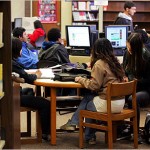

The New York Times has a great new blog on school libraries: Do they need books? The commentators are, for the most part, wonderfully thoughtful about the subject, and I was especially impressed by William Powers, who will be publishing a book called “Hamlet’s BlackBerry: A Practical Philosophy for Building a Good Life in the Digital Age.” See his thoughts below, along with the link to the NYT blog.
The Kindle comes in a box with the words “Once upon a time” printed on the side. My own experience with the Kindle confirms what Powers says. Kindle is great for travel and when you carry it around with you, you are never at a loss for reading material. But trying to do anything like the deep read is–at least so far–really impossible. For my course on Childhood and Children’s Literature, I put at the very top of my syllabus the wonderful words of Tim Wynne-Jones about the deep read. I’ve quoted him before on this blog, and I wanted to quote him again, because his words resonate so well with what Powers has to say. I like the idea of considering reading as deep-sea diving–it captures the idea of immersion. But I tend to see reading as less oceanic than aerial, something akin to flying and soaring into a new world–you pass through a portal, get to Elsewhere, and inhabit a world of possibilities, living and breathing the air of the story world.
“The deep-read is when you get gut-hooked and dragged overboard down and down through the maze of print and find, to your amazement, you can breathe down there after all and there’s a whole other world. I’m talking about the kind of reading when you realize that books are indeed interactive. . . . I’m talking about the kind of deep-read where it isn’t just the plot or the characters that matter, but the words and the way they fit together and the meandering evanescent thoughts you think between the lines: the kind of reading where you are fleetingly aware of your own mind at work.”
–Tim Wynne-Jones, “The Survival of the Book”
http://roomfordebate.blogs.nytimes.com/2010/02/10/do-school-libraries-need-books/
So it goes with books. What are often considered the weaknesses of the old-fashioned book are in some ways its strengths. For instance, a physical book works with the body and mind in ways that more readily produce the deep-dive experience that is reading at its best. When you read on a two-dimensional screen, your mind spends a lot of energy just navigating, keeping track of where you are on the page and in the text. The tangibility of a traditional book allows the hands and fingers to take over much of the navigational burden: you feel where you are, and this frees up the mind to think.
Moreover, I believe that in a hyper-connected age, the fact that books are not connected to the electronic grid is becoming their greatest asset. They’re a space apart, a private place away from the inbox where we can go to quiet our minds and reflect. Isn’t that the state in which the best kind of learning occurs?